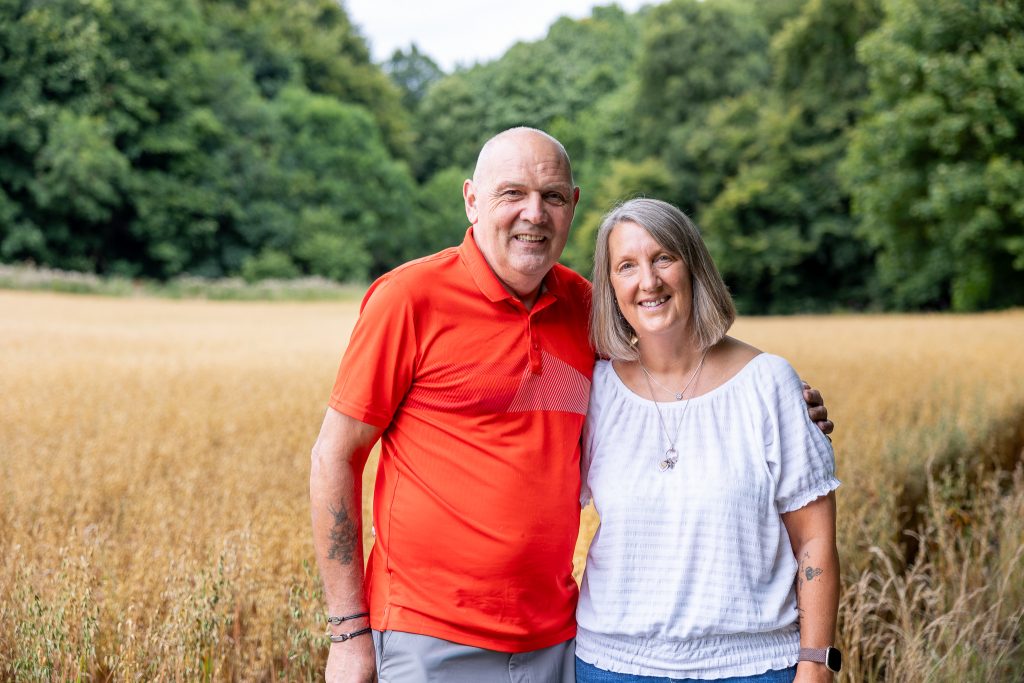Rethink Dementia – Irene
Irene Donaldson (62), mother of one from Kennoway, Fife, is living with Early Onset Alzheimer’s Disease.
Signs of dementia
Irene was working as a Deputy Head Teacher at the time of her diagnosis at the age of 53.
At that time, Irene recalled a change in her memory and organisation capability, noting she would often forget things such as her bank cards, purse and house keys. This became a contentious matter for her family members after multiple door lock changes, many missed appointments and the house becoming very chaotic and messy.
Despite many conversations trying to raise their concerns, Irene dismissed this, always finding an excuse, usually the busy and stressful nature of her work. It came to a head when something went wrong at work.
“The Head Teacher at the time had given me a job to do, and when she followed up on it, I couldn’t remember her giving me the task. When I completed the task later and went to file the document, I noticed there was already a completed document filed that I had done previously. I presented this to the Head Teacher, and she remarked that she knew there was something wrong.”
Irene notes that she went home upset that evening and confided in her family. She was upset that people were talking about her and not with her, but her family affirmed the Head Teacher’s concerns. They had been worried about her too. “This led to me visiting my GP – who was magnificent. She knew me well and felt this was out of character and needed to be investigated”, Irene said.

Getting a dementia diagnosis
After being referred to a psychologist and consequently a neurologist, she was diagnosed with dementia.
“The diagnosis was a bit of a surprise. My mum had lived with vascular dementia, and I could see no similarities between her difficulties and what I was experiencing. My mum had led a good life with dementia, thanks to her family and her close-knit group of friends. So on receiving my diagnosis I was quite positive. I believed my future would be the same but sadly this wasn’t the case and my life changed dramatically. The world around me didn’t treat me in the same way – it was a very challenging time.”
However, Irene’s true friends and close family members stood up and made the difference, and Irene thanks social connection for helping her through the incredibly dark times. Thanks to their support, she was able to continue to live her life with some adjustments.
“I can still do most of the things that I used to do before, I just do them slightly differently and need people to help me.”
Living with Early Onset Alzheimer’s Disease
Irene’s daughter Lynn offered help at the hardest times, reminding her of her strength and encouraging her to be positive and to look ahead with determination. She refused to let her mum be swamped by the negativity and stood by her side. She helped her use technology to manage her diary and encouraged her to see life beyond her lost career.
Her partner, Allan, has also played an important role in helping Irene live well with dementia. For example, adjusting her home to suit her needs, including adding electronically controlled lights, de-cluttering the house so it’s easier to locate items and, more recently, building a ramp to their back garden.
Irene also believes physical activity helps her to be and do as well as she can be. She regularly visits her local gym to take part in classes or swimming, where instructors adapt the classes, where required, to include and support her.
“Staying active in any shape or form has helped me stay more connected and helps with my balance and coordination. Daily walks with my wee dog are an essential part of daily life and being outside is mood lifting and keeps me connected with my community.”
Dementia support groups
When Irene was first diagnosed, she noticed there was a lack of support available for those living with dementia.
“There was no support for people my age. There were community groups with older people, but I wasn’t really interested in the sorts of activities these groups did. Also, my mum had attended groups, but she was collected by a taxi and returned home. She loved her clubs but had no means of sharing what she had done there. I did not want that for me.”
Irene was so fortunate to meet a group of like-minded people all living with a diagnosis of Early Onset Dementia. With the help of two very determined ladies, they together formed a peer support group called STAND. The group is based on building social connection and engaging in peer support, as well as taking part in cognitive activities.
Through STAND, Irene also takes part in activism work to help breakdown the stigma of living with dementia. Among many things, this includes regularly visiting schools to help children become dementia friends for people living with dementia.
Advice after a dementia diagnosis
For others diagnosed with dementia, Irene wants to remind them that everyone’s experience of dementia is different. She would recommend staying connected and socially active.
For those who know someone living with dementia, Irene wants to encourage them to see beyond the diagnosis and focus on their family member or friend as the person they know and love, to stay connected and to be there to help.